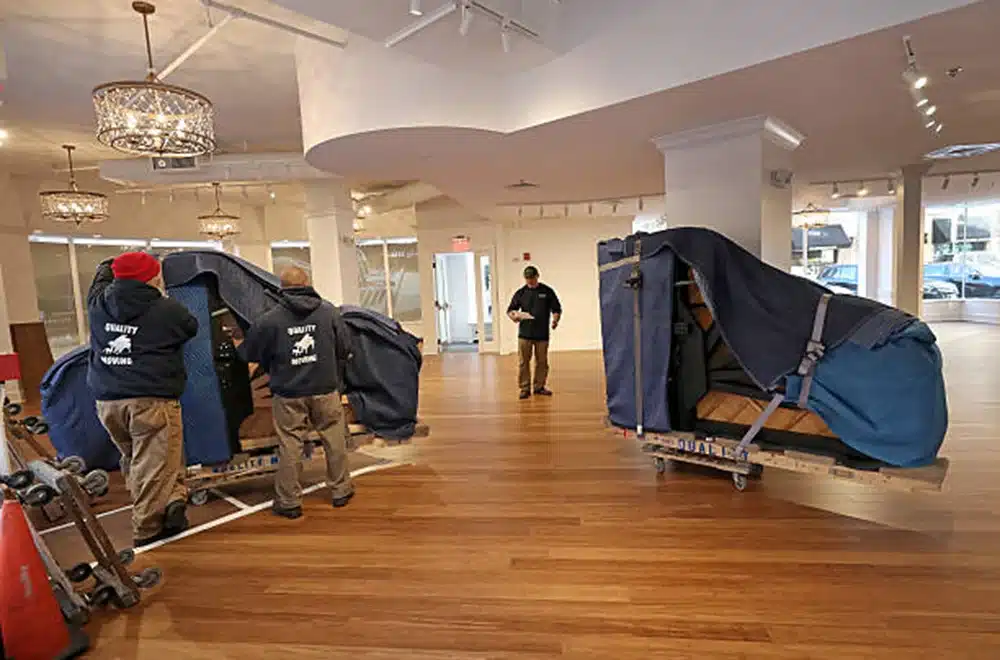Ever wondered what would happen if a piano got dropped during a move? It’s a nightmare scenario that most piano owners hope never to face, but it’s a valid concern. Pianos are not only heavy and awkward to move, but also delicate and highly valuable. A single slip can lead to serious moving accidents, which is why it’s so important to have a team that knows exactly how to mitigate piano moving risks. Thankfully, professional piano movers have strict protocols, high-grade equipment, and insurance coverage to handle these rare but serious situations when they move the piano. While the idea of a dropped piano may sound like a disaster waiting to happen, it’s something the pros prepare for and know how to manage. From protecting your instrument to ensuring you’re covered in case something goes wrong, professional movers are trained for it all. In this guide, we’ll cover what really happens if a piano is dropped, the types of damage that can result, and how trusted companies like Piano Movers of Houston tackle these challenges with speed, care, and professionalism.
How Common Are Piano Moving Accidents?
Piano moving accidents are surprisingly rare when you hire professional movers. Reputable companies like Piano Movers of Houston have highly trained crews, established safety protocols, and equipment specifically designed to move heavy, sensitive instruments like an upright piano. This results in a very low incident rate.
However, the risk increases significantly when people attempt a DIY move or hire general movers without piano-specific experience. In these situations, it’s not uncommon to see pianos dropped due to poor lifting techniques, improper securing methods, or simply a lack of knowledge about how fragile pianos truly are on the inside. Common causes of dropped piano accidents include poor weather conditions like rain or ice that can make moving ramps slippery. Stairs, narrow hallways, and uneven terrain also pose serious challenges. But with the right equipment, strategy, skill, and preparation, these risks are dramatically reduced.
What Kind of Damage Can Occur If a Piano Is Dropped?
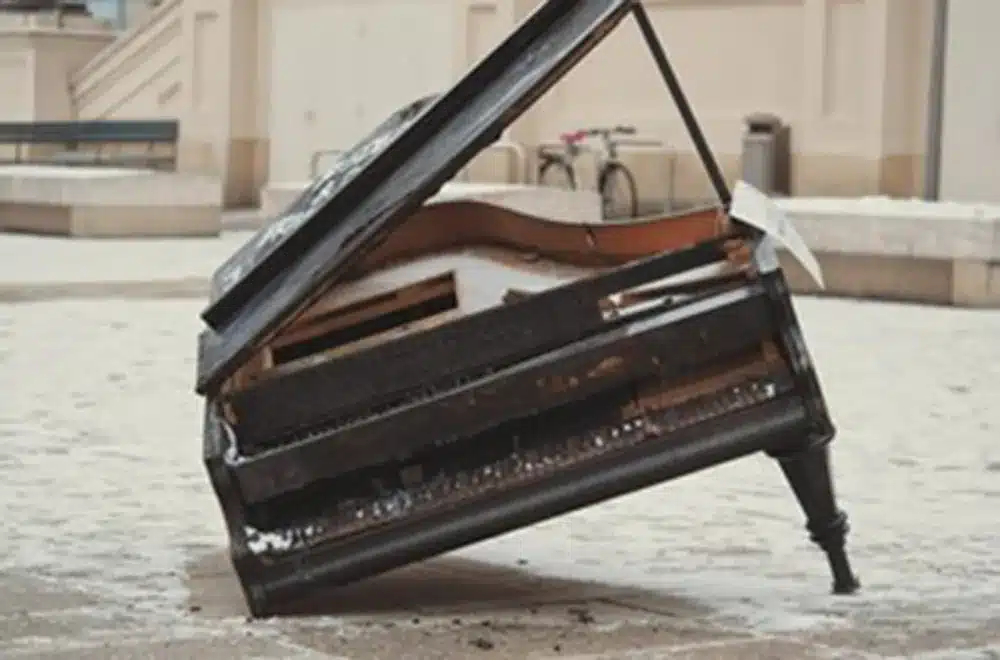
A dropped piano can suffer extensive damage, both externally and internally, emphasizing the importance of proper moving techniques. On the exterior, you might see deep scratches, cracked wood, broken legs, or dents in the casing. These issues are costly to repair and can impact both the instrument’s value and appearance. The interior damage can be even more severe. A drop can lead to broken strings, a cracked soundboard, or misaligned keys. Some of these problems may require extensive repairs, while others, like a cracked soundboard, can mean the piano may never be fully restored to its original sound quality. In the worst-case scenario, particularly for antique or high-end grand pianos, the damage can be irreversible. A cracked frame or severely broken internal components might render the instrument unplayable or economically beyond repair.
How Professional Piano Movers Handle Accidents On-Site
If the unthinkable does happen, professional piano movers don’t panic; they act. The first step is an immediate on-site assessment to determine the type and extent of the damage. This inspection is typically performed right after the incident to prevent further harm and to document everything clearly. Next, they initiate emergency damage control to ensure the piano is moved safely and assess the weight of the piano for proper handling. If a leg is broken or the pedals are dislodged, temporary fixes may be applied to prevent further damage. Movers use stabilizers, foam padding, or custom crates to keep the piano safe during the rest of the transport.
Most importantly, professional movers prioritize open, honest communication about potential piano moving risks. They’ll walk you through the findings, explain what’s been done so far, and outline the next steps. If insurance is involved, they’ll begin the claims process right away, handling the documentation and logistics so you’re not left wondering what comes next.
Why Hiring a Professional Reduces the Risk of Piano Drops
So, how do pros help avoid piano moving accidents? Professional piano movers bring the right tools, including specialized gear like piano boards, moving straps, dollies, padding, and even climate-controlled trucks. More importantly, they operate as a team, using coordinated lifting techniques and careful route planning to avoid risky situations. Every step is calculated, from how the piano is tilted to how it’s secured during transport. When needed, they’ll disassemble parts of the piano, such as pedals, legs, or lids, and reassemble them with precision at the destination. This proper disassembly and reassembly process reduces stress on the instrument and improves maneuverability, especially in tight spaces or stairwells.
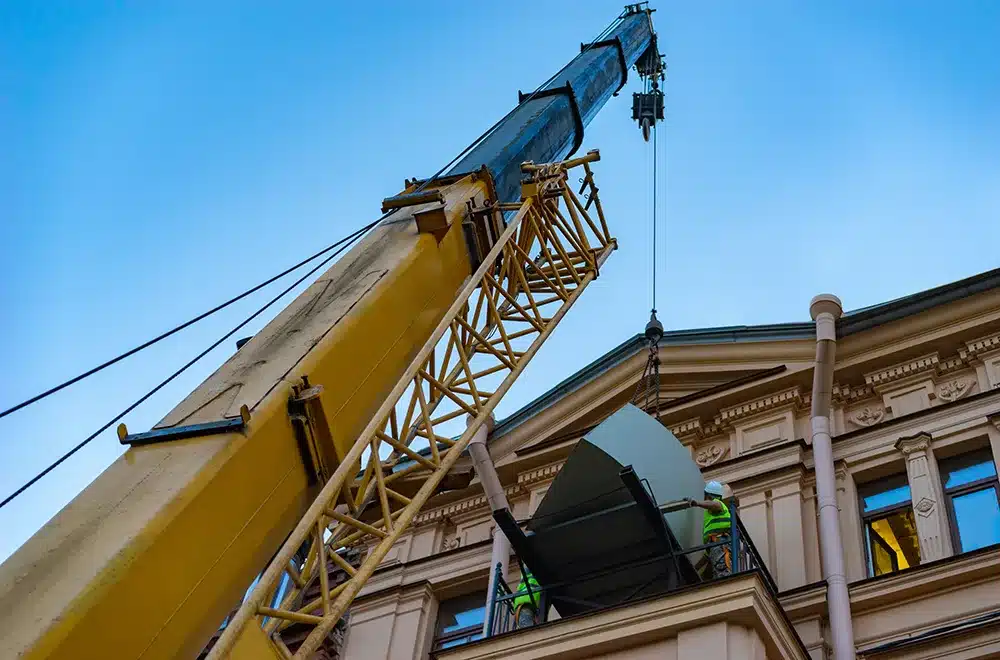
By hiring a company that specializes in this work, like Piano Movers of Houston, you’re investing in safety, skill, and peace of mind. Explore Our Piano Moving Services in Houston to learn more about how we protect your instrument every step of the way.
Understanding Piano Moving Insurance
No matter how careful the team is, accidents can still happen when you move a piano, which makes piano moving insurance a must-have. Most professional piano movers offer two types of coverage: basic liability and full-value protection. Basic liability usually covers a limited amount per pound, while full-value protection covers the repair or replacement of your piano based on its current market value, which is crucial when hiring professional piano movers. But it’s important to understand that not all damage is treated equally. Cosmetic issues like scratches or scuffs may be covered under one policy, while structural damage, like a cracked soundboard, might require a higher level of protection when you move a piano. That’s why customers need to request the insurance policy in writing before booking any piano mover. Ask whether their coverage includes both transport and handling, what their deductible is, and how claims are processed. It’s a small step that can save you big headaches later.
Real-World Example: How Piano Movers of Houston Handles Accidents
Let’s say a customer in Houston hires us to move their cherished baby grand into a third-floor apartment. Everything goes smoothly until a sudden summer rainstorm makes the outdoor stairway dangerously slippery. Despite all precautions, the piano slips. One of its legs is damaged, and the body shifts slightly to the side. It’s a tense moment, but thanks to our crew’s training and quick thinking, they prevent further harm. Protective gear including braces are quickly resecured, and the piano is stabilized before it’s moved any farther. Our crew immediately assesses the damage and informs the homeowner with complete transparency about the reasons not to move the piano without professional help. They document everything, taking photos, filling out an internal incident report, and noting exactly what happened. If the damage is minor and repairable, quick fixes may be performed on-site or scheduled promptly. If major repairs are needed, we coordinate with a trusted piano technician and help initiate the insurance claim.
Throughout the process, the customer is kept informed and reassured at every step, particularly regarding the weight of the piano. Accidents are rare, but when they happen, Piano Movers of Houston puts its customer-first approach into full gear. It’s this level of care and accountability that helps us maintain our top-tier reputation in the Houston piano moving industry, especially when we move pianos safely.
FAQs About Piano Moving Accidents
Q1: What should I do if my piano is dropped during a move?
A: Stay calm and avoid trying to move it yourself. Let the movers conduct an initial inspection. Document everything with photos and ask for a written report. If you’ve hired professional piano movers, they’ll guide you through the insurance and repair process.
Q2: Will my piano be insured against damage?
A: If you hired a reputable company, yes. Most offer at least basic coverage, and some provide full-value protection. Always confirm insurance coverage before you unload or book your piano moving service.
Q3: Can a dropped piano be repaired?
A: In many cases, yes. Cosmetic damage is typically easy to fix, while internal damage depends on the severity and model of the piano. However, repairs for antiques or grand pianos can be complex and costly.
Q4: How do I check if a moving company has proper insurance?
A: Ask for their Certificate of Insurance (COI) and read through the details. Make sure it covers both general liability and cargo (item) protection. Don’t rely solely on verbal assurances.
Q5: How can I avoid piano moving accidents altogether while using proper moving techniques?
A: Hire experienced, professional piano movers with verified reviews and insurance. Avoid DIY moves or hiring general movers who lack piano-specific expertise and equipment.
Related Posts
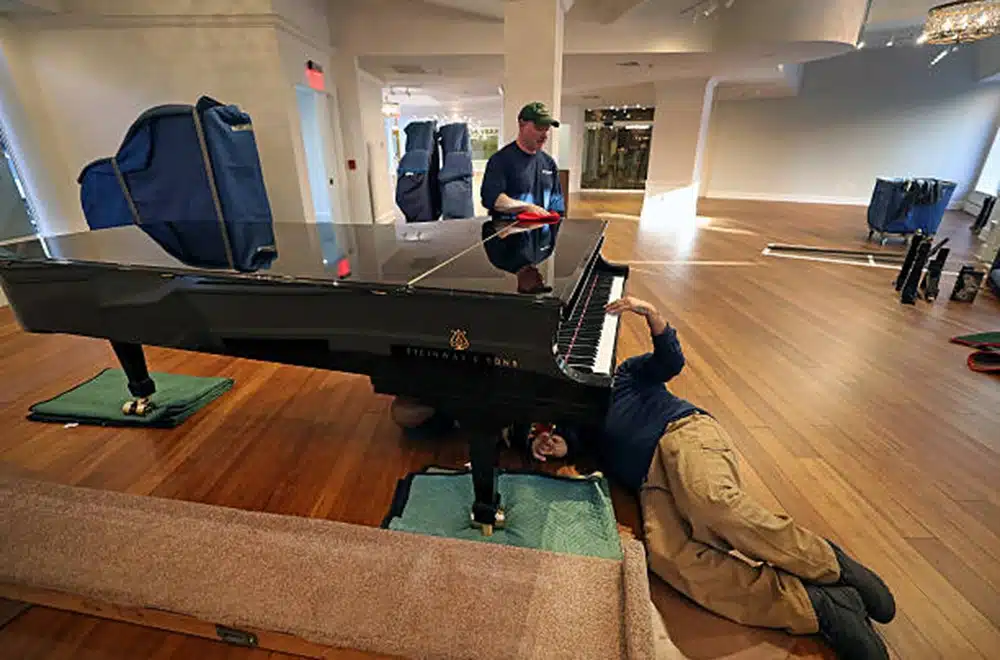
Preparing Your Piano for a Move: What Professionals Do Before It Leaves
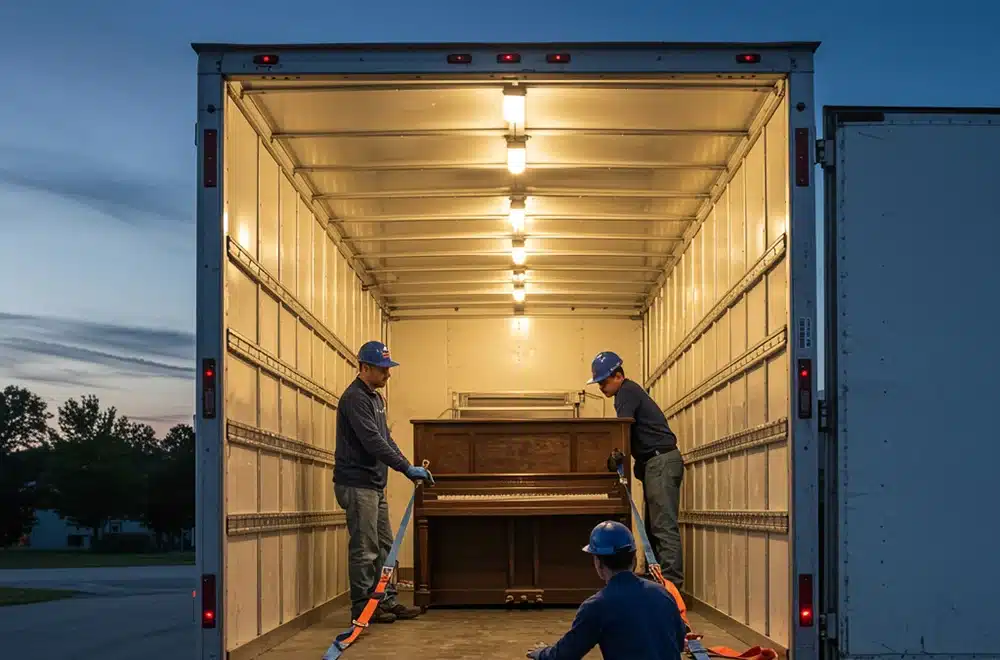
Move Your Piano in a Climate-Controlled Transport: Why It Matters
